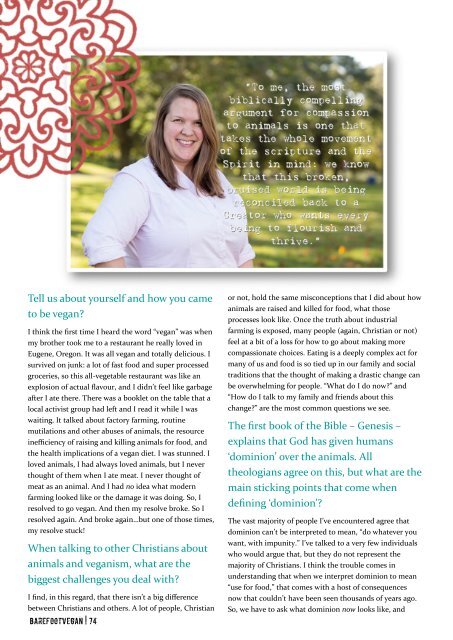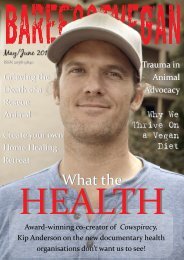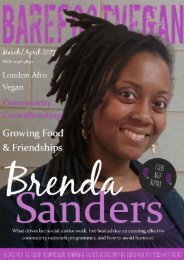Barefoot Vegan Mag Jan_Feb 2017
Create successful ePaper yourself
Turn your PDF publications into a flip-book with our unique Google optimized e-Paper software.
Tell us about yourself and how you came<br />
to be vegan?<br />
I think the first time I heard the word “vegan” was when<br />
my brother took me to a restaurant he really loved in<br />
Eugene, Oregon. It was all vegan and totally delicious. I<br />
survived on junk: a lot of fast food and super processed<br />
groceries, so this all-vegetable restaurant was like an<br />
explosion of actual flavour, and I didn’t feel like garbage<br />
after I ate there. There was a booklet on the table that a<br />
local activist group had left and I read it while I was<br />
waiting. It talked about factory farming, routine<br />
mutilations and other abuses of animals, the resource<br />
inefficiency of raising and killing animals for food, and<br />
the health implications of a vegan diet. I was stunned. I<br />
loved animals, I had always loved animals, but I never<br />
thought of them when I ate meat. I never thought of<br />
meat as an animal. And I had no idea what modern<br />
farming looked like or the damage it was doing. So, I<br />
resolved to go vegan. And then my resolve broke. So I<br />
resolved again. And broke again…but one of those times,<br />
my resolve stuck!<br />
When talking to other Christians about<br />
animals and veganism, what are the<br />
biggest challenges you deal with?<br />
I find, in this regard, that there isn’t a big difference<br />
between Christians and others. A lot of people, Christian<br />
BAREFOOT<strong>Vegan</strong> | 74<br />
or not, hold the same misconceptions that I did about how<br />
animals are raised and killed for food, what those<br />
processes look like. Once the truth about industrial<br />
farming is exposed, many people (again, Christian or not)<br />
feel at a bit of a loss for how to go about making more<br />
compassionate choices. Eating is a deeply complex act for<br />
many of us and food is so tied up in our family and social<br />
traditions that the thought of making a drastic change can<br />
be overwhelming for people. “What do I do now?” and<br />
“How do I talk to my family and friends about this<br />
change?” are the most common questions we see.<br />
The first book of the Bible – Genesis –<br />
explains that God has given humans<br />
‘dominion’ over the animals. All<br />
theologians agree on this, but what are the<br />
main sticking points that come when<br />
defining ‘dominion’?<br />
The vast majority of people I’ve encountered agree that<br />
dominion can’t be interpreted to mean, “do whatever you<br />
want, with impunity.” I’ve talked to a very few individuals<br />
who would argue that, but they do not represent the<br />
majority of Christians. I think the trouble comes in<br />
understanding that when we interpret dominion to mean<br />
“use for food,” that comes with a host of consequences<br />
now that couldn’t have been seen thousands of years ago.<br />
So, we have to ask what dominion now looks like, and





